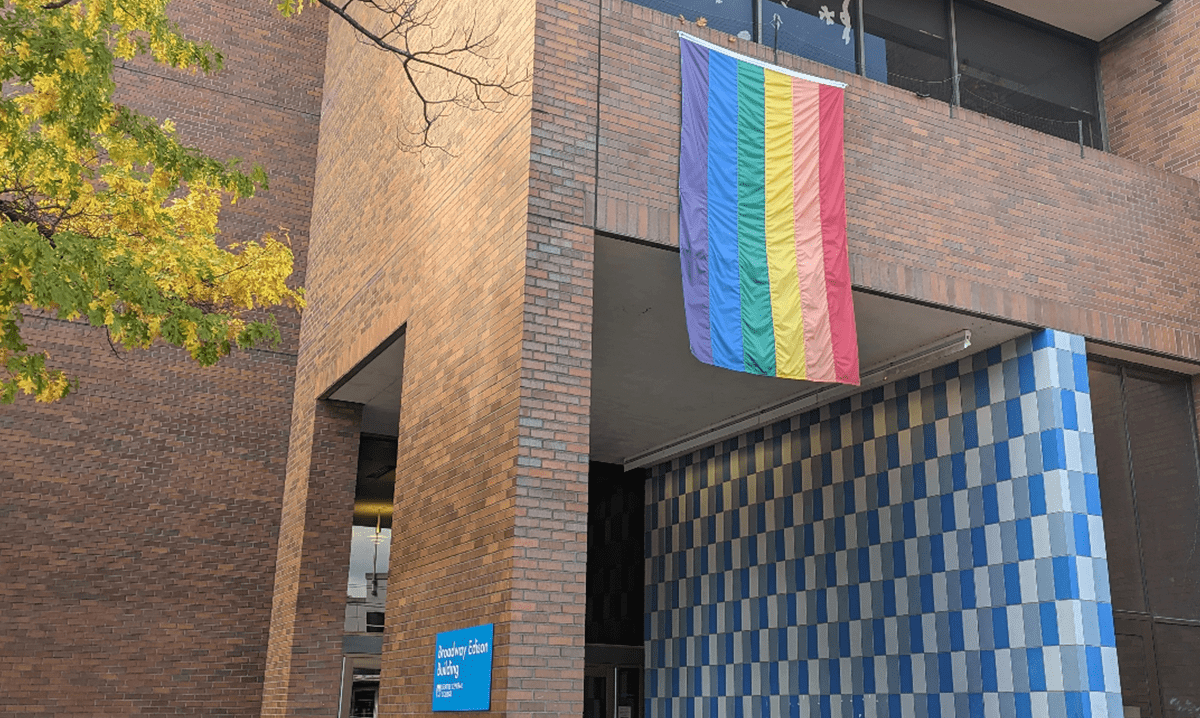Seattle Central’s Queer Trans Cooperative is a relatively new organization. During their first quarter returning from online classes in 2021, co-founder Jared Stern Rogers found that the previous LGBTQ+ club on campus, the Queer Cooperative, disappeared during the pandemic. After restarting the club under a new name and finding a co-leader, members helped write procedure that Stern Rogers says has been adopted at Central. The procedures put aside funds every two years for the construction of an all-gender restroom and allow transitioning students to receive a free ID card change every quarter. This year, they’re working on bringing those changes to the district level and adjusting the ID card policy alongside a plethora of other projects.
All-gender restrooms
All-gender restrooms are a large-scale project, and Stern Rogers noticed it’s hard for students involved to pass the work on to someone else once they graduate.
“The way it goes at most schools is that a couple students or a single student pushes really hard to get an all-gender restroom, they may or may not get one, and then they graduate,” Stern Rogers said. “And then it stops.”
To solve that problem, the Queer Trans Cooperative looked to institutionalize the creation of all-gender restrooms.
“We want to create a system that could outlast us,” Stern Rogers said.
The procedure that was later adopted puts aside funds in the biannual school budget for the construction or conversion of a new all-gender restroom, Stern Rogers says. The location of the restroom is not decided by cisgender students or staff and prioritizes buildings that don’t have an all-gender restroom. All new buildings are required to have exclusively all-gender restrooms, prioritizing single stalls.
The club doesn’t feel like the work is done, though. Stern Rogers says that Central still does not have enough all-gender restrooms.
“They’re missing them in very crucial locations such as the first floor of the building. They’re often out of the way and/or hard to find,” they said.
ID Card Changes for Transitioning Students
The Queer Trans cooperative holds meetings in an office where an ID card is required to get in. After realizing that a lot of their members didn’t have a card, Stern Rogers started asking students why.
“When you are transitioning after a couple months your photo doesn’t look like you, your name isn’t your name anymore. It outs students,” they said.
Guaranteeing free ID card changes for students who are transitioning is one of the main components of the club’s ID card project. Replacement cards at Central typically cost $30, but the procedure allows transitioning students to receive free replacement cards. As of now, a student can get a replacement card for free, but it will not automatically update their email address associated with ctcLink. Vice President of Student Services Kao LeZheo tells The Seattle Collegian that a solution to that component is in progress.
Stern Rogers says there’s also not a great way of redeeming the card, which is something the club is working on.
“We need a practical way that people can privately and confidentially redeem that ID card, so that they don’t have to out themselves,” they said.
One idea the club has is to have students tell someone in the Office of Equity, Diversity, Inclusion and Community (EDIC) that they need a new card — if it’s absolutely necessary to have them tell someone.
Bringing the changes to the district
One of the club’s main goals this year is to bring the new policies to the North and South Seattle Colleges, and they seem to have the support of leadership on a district level. In a 2023 board of trustees meeting, the Queer Trans cooperative spoke about Central’s new policies and mentioned that they wanted to bring those changes to the rest of the district.
“We never wanted these changes to be selfish. These are not issues unique to Seattle Central College. These inequities are not hyper-localized, and we’d done most of the work. We’ve written the policies, we have people at every level that are informed of them and how to actually bring them into practice.”
The Board of Trustees and Chancellor wanted the college presidents to work on the project as soon as possible, Stern Rogers says.
“The Board of Trustees and the Chancellor said ‘I know you’re planning on bringing this next year, let’s do it a little bit sooner. Let’s get it out as soon as we can,’” they said.
The club is already looking beyond this year’s goals.
“Maybe in the future, we can use the three colleges as a way of advocating for this at colleges outside of our district.”
Trans day of remembrance
Their advocacy for procedure changes is far from being the only project the club is working on. They’re also investigating how represented students feel in their classes and trying to place a pride center in all three Seattle Colleges. Their most immediate project, however, is Trans Day of Remembrance.
Last year, the club received feedback from students saying they’d like to know more about the people they were remembering other than their names.
“We shouldn’t be reducing people to a statistic, we want to humanize these individuals, make them seem like they could be your neighbor because they often are,” Stern Rogers said.
This year, they’re planning to have a display of standing easels that have pictures and details about the lives of those they’re remembering at each of the Seattle Colleges, running from Nov. 13 to Nov. 17.
“You go up to each of them and almost have a conversation so you can learn about them, humanize them, and then you see that there are so many people, and you realize that they’re all gone.”
The exact details of the event are still being worked out, and are subject to change.







Be First to Comment